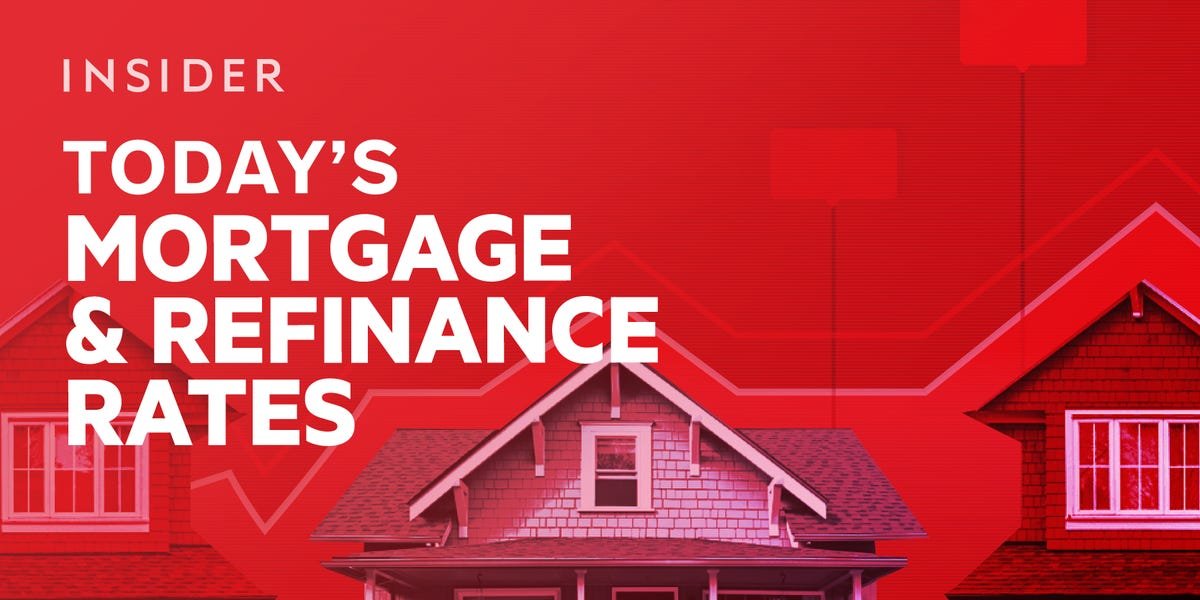Our experts answer readers’ home-buying questions and write unbiased product reviews (here’s how we assess mortgages). In some cases, we receive a commission from our partners; however, our opinions are our own.
Mortgage rates rose this week in response to still-warm inflation, and they’ll likely remain elevated until we get more data showing how inflation is trending this year. If inflation remains near current levels or looks like it’s ticking back up, mortgage rates could climb higher.
Average 30-year mortgage rates rose 13 basis points to 6.77% this week, according to Freddie Mac. Average 15-year rates also spiked back up above 6% for the first time since mid-December.
“On the heels of consumer prices rising more than expected, mortgage rates increased this week,” Sam Khater, Freddie Mac’s chief economist, said in a press release. “The economy has been performing well so far this year and rates may stay higher for longer, potentially slowing the spring homebuying season. According to our data, mortgage applications to buy a home so far in 2024 are down in more than half of all states compared to a year earlier.”
On Tuesday, the Bureau of Labor Statistics reported that the Consumer Price Index rose 3.1% year over year in January, which is more than expected.
Then, on Friday, the latest Producer Price Index report also came in hotter than expected, which markets took as a sign that inflation may remain higher for longer.
The PPI measures wholesale price inflation. It doesn’t often make as big of a splash as the CPI, but at a time when everyone is trying to guess when the Federal Reserve will start cutting rates, any new inflation data is under intense scrutiny.
What does this have to do with mortgage rates? Once the Fed starts lowering its benchmark rate, the federal funds rate, mortgage rates are expected to go down as well.
But this depends on inflation continuing to come down. Fed officials have said that they want to see more data before they consider lowering rates, and if the next few months show that inflation is stagnating, we might have to wait longer before we get a Fed cut.
Currently, investors generally believe that we won’t see the Fed cut rates until June at the earliest, according to the CME FedWatch Tool. And depending on how inflation continues to trend, we may need to wait even longer. This means we might not see mortgage rates fall substantially until the second half of 2024.
Today’s mortgage rates
| Mortgage type | Average rate today |
|
|
|
|
|
|
|
|
|
|
|
|
|
|
|
|
|
|
|
|
|
Today’s refinance rates
| Mortgage type | Average rate today |
|
|
|
|
|
|
|
|
|
|
|
|
|
|
|
|
|
|
|
|
|
Mortgage Calculator
Use our free mortgage calculator to see how today’s interest rates will affect your monthly payments:
Mortgage Calculator
$1,161 Your estimated monthly payment
- Paying a 25% higher down payment would save you $8,916.08 on interest charges
- Lowering the interest rate by 1% would save you $51,562.03
- Paying an additional $500 each month would reduce the loan length by 146 months
By clicking on “More details,” you’ll also see how much you’ll pay over the entire length of your mortgage, including how much goes toward the principal vs. interest.
Mortgage Rate Projection for 2024
Mortgage rates started ticking up from historic lows in the second half of 2021 and increased dramatically in 2022 and throughout most of 2023.
But many forecasts expect rates to fall this year now that inflation has been coming down. In the last 12 months, the Consumer Price Index rose by 3.1%, a significant slowdown compared when it peaked at 9.1% in 2022.
For homeowners looking to leverage their home’s value to cover a big purchase — such as a home renovation — a home equity line of credit (HELOC) may be a good option while we wait for mortgage rates to ease. Check out some of our best HELOC lenders to start your search for the right loan for you.
A HELOC is a line of credit that lets you borrow against the equity in your home. It works similarly to a credit card in that you borrow what you need rather than getting the full amount you’re borrowing in a lump sum. It also lets you tap into the money you have in your home without replacing your entire mortgage, like you’d do with a cash-out refinance.
Current HELOC rates are relatively low compared to other loan options, including credit cards and personal loans.
When Will House Prices Come Down?
We aren’t likely to see home prices drop this year. In fact, they’ll probably rise.
Fannie Mae researchers expect prices to increase 3.20% in 2024 and 0.30% in 2025, while the Mortgage Bankers Association expects a 4.10% increase in 2024 and a 3.30% increase in 2024.
Sky high mortgage rates have pushed many hopeful buyers out of the market, slowing homebuying demand and putting downward pressure on home prices. But rates have since eased, removing some of that pressure. The current supply of homes is also historically low, which will likely push prices up.
What Happens to House Prices in a Recession?
House prices usually drop during a recession, but not always. When it does happen, it’s generally because fewer people can afford to purchase homes, and the low demand forces sellers to lower their prices.
How Much Mortgage Can I Afford?
A mortgage calculator can help you determine how much house you can afford. Play around with different home prices and down payment amounts to see how much your monthly payment could be, and think about how that fits in with your overall budget.
Typically, experts recommend spending no more than 28% of your gross monthly income on housing expenses. This means your entire monthly mortgage payment, including taxes and insurance, shouldn’t exceed 28% of your pre-tax monthly income.
The lower your rate, the more you’ll be able to borrow, so shop around and get preapproved with multiple mortgage lenders to see who can offer you the best rate. But remember not to borrow more than what your budget can comfortably handle.




